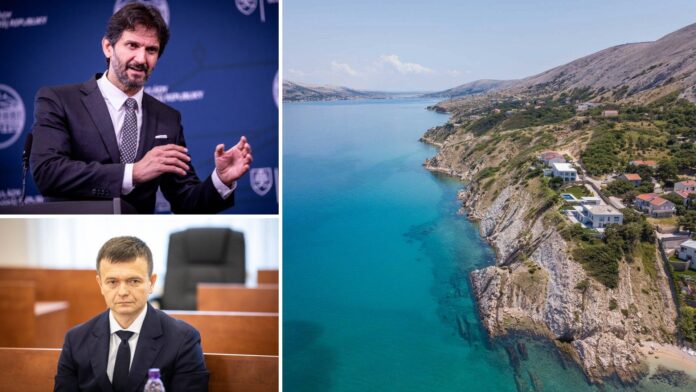Slovak Defence Minister Robert Kaliňák has admitted that his wife owns a luxury villa on the Croatian coast—after being exposed by journalists for failing to declare it, in apparent violation of constitutional law. The undisclosed property, purchased for €296,000, lies just two houses away from land owned by Jaroslav Haščák, a controversial financier linked to the infamous Gorilla corruption scandal. Kaliňák, who once accused Haščák’s firm of trying to “destroy” his party, now finds his family’s assets in the shadow of his former adversary. Rather than apologising for the omission, Kaliňák defended his actions as an act of “higher constitutional interest”—a justification critics call an outright admission of dishonesty.
Meanwhile, speculation surrounds Prime Minister Robert Fico, who is facing separate allegations of secretly owning a Croatian villa. Although he denies the claims, opposition leader Igor Matovič has launched a personal search for evidence. With mounting pressure and calls for accountability, this scandal could force Slovakia’s ruling elite to answer long-standing questions about hidden wealth and political privilege.
A recent investigation by Aktuality.sk uncovered that Zuzana Kaliňáková, the wife of Defence Minister Robert Kaliňák, owns a villa on the Croatian island of Pag. The property, located in a secluded area, had not been publicly disclosed until now. Once confronted with the evidence, Kaliňák had no choice but to admit its existence. However, rather than simply acknowledging the omission, he framed his actions as a moral dilemma and presented himself as someone who made an ethical choice.
Kaliňák stated that his wife purchased the property over six years ago for €296,000, explaining that their children’s respiratory issues motivated the decision. However, the core issue is that the villa was never declared in his wife’s asset disclosure, as required by Slovakia’s constitutional law on conflict of interest. This raises serious concerns about compliance with transparency regulations.
Adding to the controversy, the villa is situated just two houses away from a 3,200 m² plot of land owned by Jaroslav Haščák, a co-founder of the financial group Penta. Penta has been at the centre of several high-profile corruption scandals, including the Gorilla case, which exposed the firm’s deep entanglements with Slovak politics. Years ago, Kaliňák himself accused Penta of trying to destroy the ruling Smer party, yet today, his family’s property stands in close proximity to Haščák’s land.
A Defiant Justification
Rather than acknowledging any wrongdoing, Kaliňák defended his decision to omit the villa from official records. In a video statement, he justified the non-disclosure by claiming that making the property public could endanger his family. He went further, suggesting that the real reason was to prevent political opponents—such as Veronika Remišová, head of the parliamentary committee on conflicts of interest—from using the information against him.
“My decision to omit the villa from the asset declaration was absolutely correct. I was protecting a higher constitutional interest, and I would not change my approach,” Kaliňák stated. This interpretation of the law—that personal security outweighs legal obligations—has been widely criticised as an abuse of power. Essentially, Kaliňák is arguing that lying on an asset declaration is justified if it serves what he considers a ‘greater good.’
A Pattern of Concealment
The scandal surrounding Kaliňák’s villa is not an isolated incident. The report also highlights that another luxury property in the same area belongs to Martina Kánová, the wife of lawyer Vladimír Kán, who has been involved in high-profile state contracts. Kán’s law firm has earned millions from public funds, raising further questions about the intersection of wealth, power, and political influence.
Meanwhile, allegations have also surfaced regarding Prime Minister Robert Fico. Croatian media reported that he is constructing a villa in the coastal town of Ražanj, though Fico has denied the claims. This denial echoes a familiar pattern: Slovak politicians often reject such allegations until undeniable evidence forces them to admit the truth.
Adding to the intrigue, former Prime Minister Igor Matovič has personally searched for Fico’s alleged property. While he identified a luxury villa in Ražanj, no definitive proof has yet linked it to Fico. Instead, the property is officially owned by Slovak businessmen Matej Gocník and Matúš Moravčík, who have indirect ties to Fico’s circle. Matovič claims they are merely ‘front men’ for Fico, though conclusive evidence remains elusive.
The Bigger Picture
Kaliňák’s admission came only after journalists exposed the villa, following a pattern seen before in Slovak politics—when denial is no longer an option, the next step is justification. Instead of acknowledging any wrongdoing, he reframed the issue as a moral dilemma and cast himself as someone who made a difficult but necessary decision. The omission of the property from asset declarations was not a mistake, but a conscious choice, justified by the claim that revealing it would have endangered his family. This explanation, however, does not change the fact that constitutional law requires full disclosure.
His defence follows a well-worn strategy—when confronted with legal obligations, invoke a “higher interest” that supposedly overrides them. The issue is not just about one undeclared villa but about the broader attitude toward transparency and accountability. The message is clear: rules that apply to ordinary citizens can be bent, ignored, or reinterpreted when it comes to those in power.
Meanwhile, suspicions persist around Robert Fico, who has faced previous scrutiny over his personal assets. While he denies building a villa in Croatia, his past handling of financial disclosures does little to dispel doubts. For years, Smer’s leadership has tried to maintain an image of being close to the people, but the steady emergence of luxury properties linked to its top figures tells a different story.
Source:
Martin Turčer and Peter Sabo | Aktuality.sk
Jana Shemesh | Denník N



